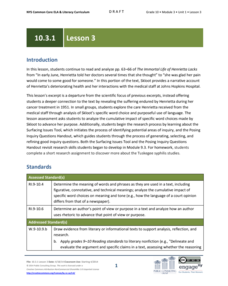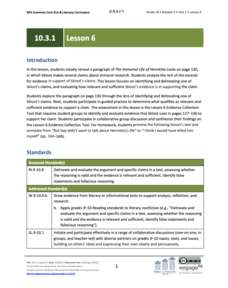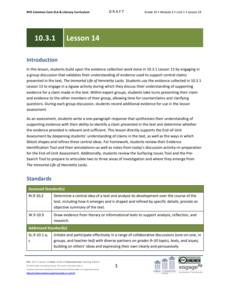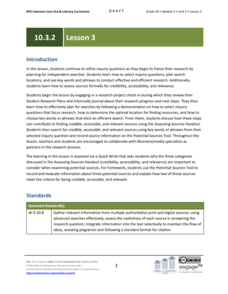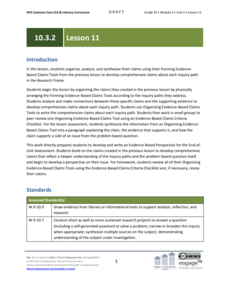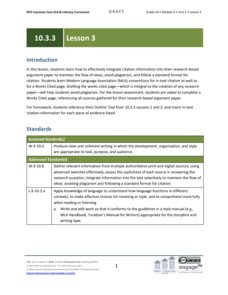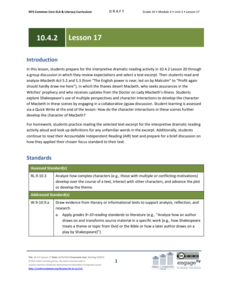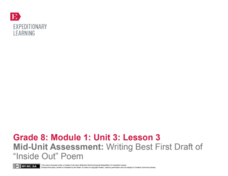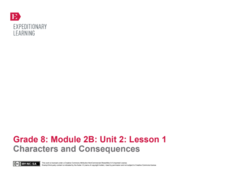EngageNY
Grade 10 ELA Module 2: Unit 1, Lesson 14
Let's see how the story unfolds. Scholars examine paragraphs of Martin Luther King Jr.'s "Letter from Birmingham Jail" to determine how King unfolds his analysis of the church. Before arriving at an answer, learners work in pairs and...
EngageNY
Grade 10 ELA Module 2: Unit 3, Lesson 3
What is in a word? Scholars look closely at the words from a speech by Eleanor Roosevelt. They analyze how she supports a claim without debate and without rejecting others. Learners use jigsaw discussion, guided questions, and respond to...
EngageNY
Grade 10 ELA Module 2: Unit 2, Lesson 3
Does trauma have a lasting effect on people's lives? Scholars dive into the topic as they read paragraphs 9–11 of "A Genetics of Justice" by Julia Alvarez, in which the author describes her family's return to the Dominican Republic....
EngageNY
Grade 10 ELA Module 3: Unit 1, Lesson 3
Choose your words wisely. Scholars examine word choice in an excerpt from The Immortal Life of Henrietta Lacks. Learners work in pairs and groups to discuss how the author's choice of words creates a deeper connection between the reader...
EngageNY
Grade 10 ELA Module 3: Unit 1, Lesson 6
Is there an underlying message? After looking at an excerpt from The Immortal Life of Henrietta Lacks, scholars discuss how the author uses words to present a claim. Learners work through an evidence tool and guided questions to support...
EngageNY
Grade 10 ELA Module 3: Unit 1, Lesson 14
Do you have a valid claim? Learners become judges of claims as they expand on evidence collected in lesson 13 and develop claims. They present claims to one another and respond to questions and counterclaims. To finish, individuals...
EngageNY
Grade 10 ELA Module 3: Unit 1, Lesson 15
It's time for the grand finale! Scholars finalize their learning in a two-part end-of-unit assessment. This assessment covers multiple standards as learners demonstrate their understanding of the central idea, comprehension, and...
EngageNY
Grade 10 ELA Module 3: Unit 1, Lesson 9
Scholars examine an excerpt from The Immortal Life of Henrietta Lacks and determine how the author builds up smaller details to create the larger idea of the main passage. To finish the lesson plan, learners discuss in pairs, answer...
EngageNY
Grade 10 ELA Module 3: Unit 2, Lesson 3
Do you know if that source is reliable? Learners examine closely to determine which sources provide reliable information for their research. Scholars use organizers to examine each source based on credibility, accessibility, and...
EngageNY
Grade 10 ELA Module 3: Unit 2, Lesson 11
It's time to prove it! Scholars now must ensure that all claims are based on evidence. Learners write detailed claims for each inquiry path using several evidence-based claims tools. At the end of the lesson plan, pupils respond to a...
EngageNY
Grade 10 ELA Module 4: Unit 1, Lesson 4
High schoolers read the final section of E. B. White’s Death of a Pig and examine the impact of the words and tone he used. In pairs, learners discuss their homework from the previous night, answer questions about the text, and write in...
EngageNY
Grade 10 ELA Module 3: Unit 3, Lesson 8
All is fair in claims and counterclaims. Scholars continue to work on their argumentative writing pieces by ensuring their papers fairly address claims and counterclaims. Writers review the importance of argumentative writing conventions...
EngageNY
Grade 10 ELA Module 3: Unit 3, Lesson 6
And that's a wrap! Scholars create their concluding statement drafts by examining model text with exemplar conclusions. In pairs, they discuss how transitional words and phrases add to sentence structure and consider how their concluding...
EngageNY
Grade 10 ELA Module 3: Unit 3, Lesson 3
Who said that? Scholars now learn how to cite evidence, give ideas proper credit, and work to understand the meaning of plagiarism. Part of the activity includes looking at an MLA Citation handbook, handy when pupils create their works...
EngageNY
Grade 10 ELA Module 4: Unit 2, Lesson 17
Madness, violence, despair—the titular character of Shakespeare's Macbeth is spiraling out of control. Pupils first explore the topic with a collaborative jigsaw discussion. At the end of the instructional activity, they write about how...
EngageNY
Grade 11 ELA Module 2: Unit 2, Lesson 10
Audre Lorde's poem "From the House of Yemanjá" describes the speaker carrying two women on her back—she must be strong! Pupils read the second stanza using instructional activity 10 of 14 from the Grade 11 ELA Module 2: Unit 2 series....
EngageNY
Analyzing the Significance of the Novel’s Title: Connecting the Universal Refugee Experience to Inside Out and Back Again
How might different authors approach the same topic? Scholars read a paragraph from an informational text about Canadian refugees using the resource. Next, they participate in a jigsaw activity to connect real-life refugees' experiences...
EngageNY
World Cafe: Analyzing Sojourner Truth’s “Ain’t I a Woman?”
May I take your order? Scholars read "Ain't I a Woman" and participate in a World Cafe. They work in small groups to discuss text-related questions and then complete a Note-Catcher sheet to organize their thoughts. For homework, learners...
EngageNY
Mid-Unit Assessment: Writing Best First Draft of “Inside Out” Poem
As part of a mid-unit assessment, scholars draft their inside-out poems and then work on their "Back Again" poems. Learners use a rubric and graphic organizers to guide their writing.
EngageNY
Text to Film Comparison: Taking a Stand at the Jailhouse (Chapters 14-15)
Readers look closely at Scout in chapter 15 of To Kill A Mockingbird. Learners use turn and talk and Analyzing Scout's and the Reader's Perspectives Note-catcher to compare their perspectives to Scout's. They then make a comparison to...
EngageNY
Writing an Argument Essay: Evaluating the Model and Crafting a Claim (Chapter 28, Including Synthesis of Scenes in Previous Chapters)
Scholars use the model essay from the previous instructional activity to create their own argumentative essays. Readers make a claim about Atticus defending Tom in To Kill A Mockingbird. They then use graphic organizers to develop and...
EngageNY
Analyzing Character and Theme: Tracking Control in A Midsummer Night’s Dream
Pupils first participate in a drama circle as they continue reading Shakespeare's A Midsummer Night's Dream aloud with classmates. Next, scholars move around and discuss text-dependent questions about the play with a Three Threes in a...
EngageNY
Characters and Consequences
Scholars consider how dialogue reveals aspects of a play's characters as they read Shakespeare's A Midsummer Night's Dream and complete a written conversation note-catcher. Additionally, pupils participate in an I Have/Who Has jigsaw...
EngageNY
Analyzing the Resolution of the Play: World Café Discussion
It's time to get active! Scholars participate in a World Café protocol to promote discussion and leadership. They leave their seats and move from group to group to discuss critical questions related to their read-aloud of Shakespeare's A...



